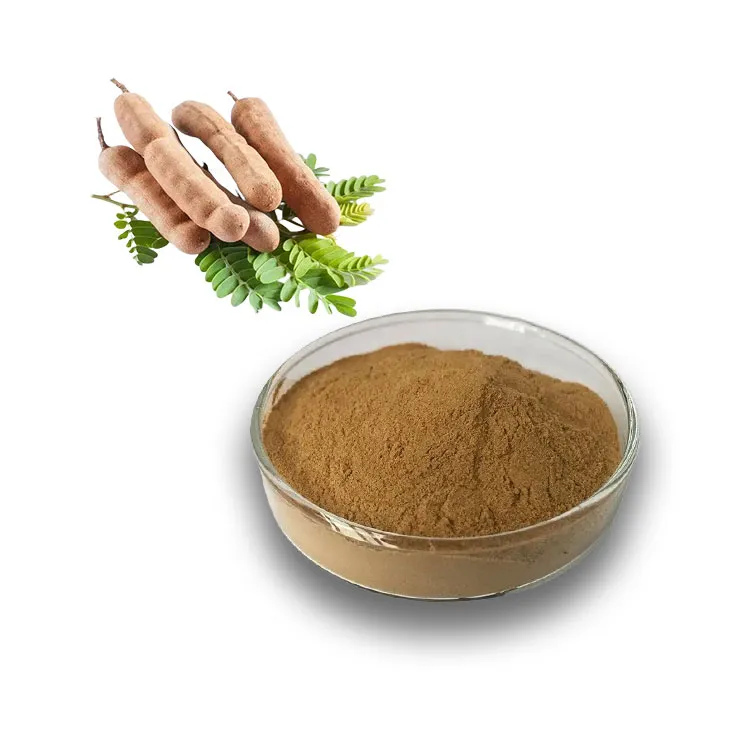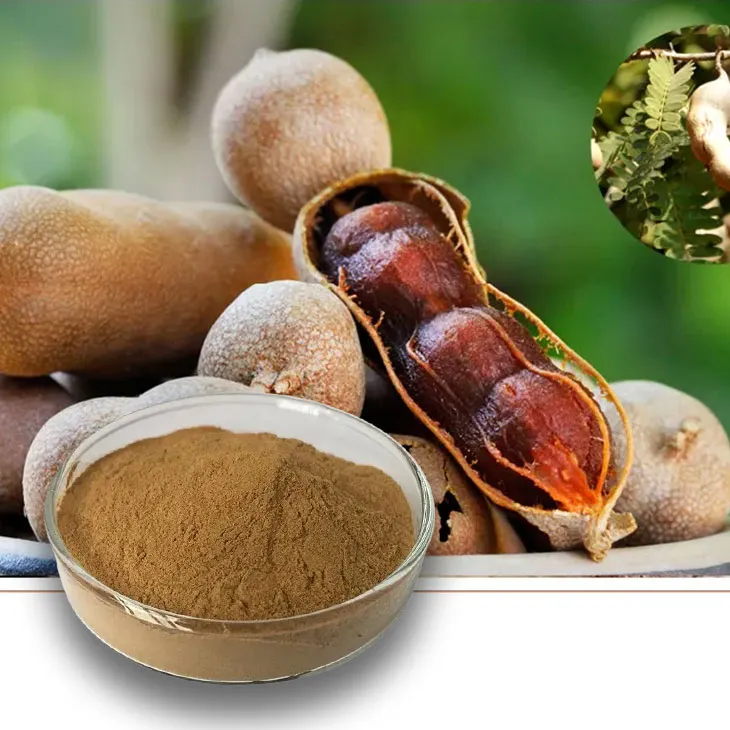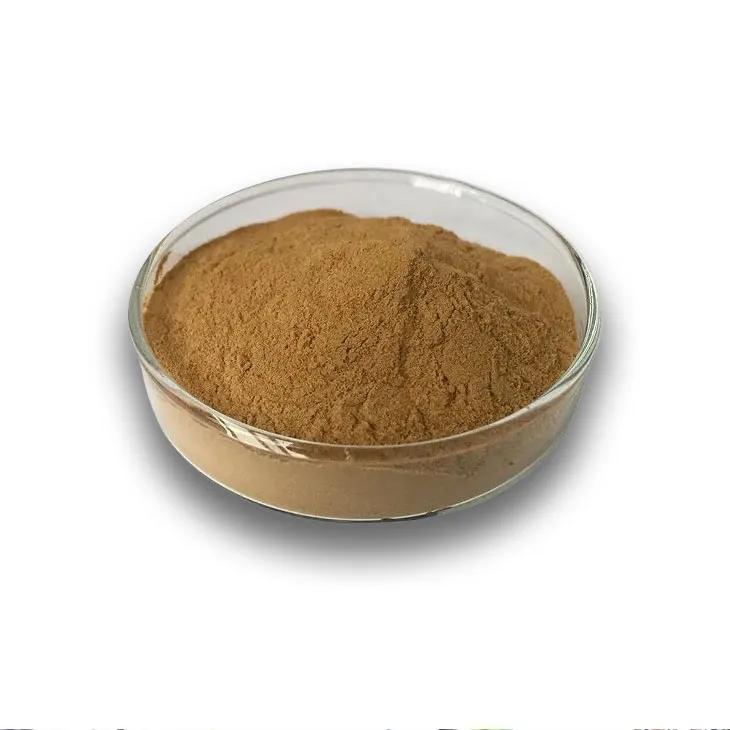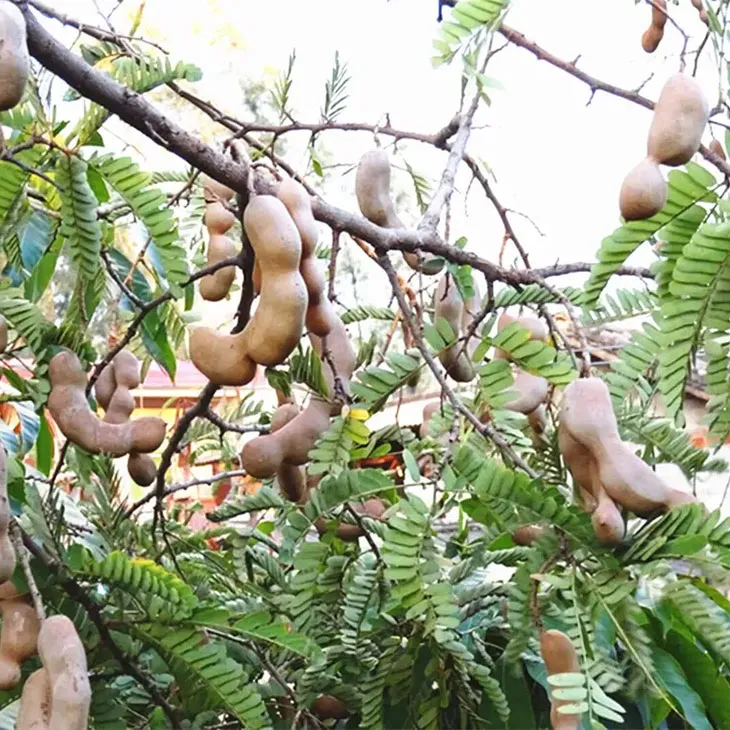- 0086-571-85302990
- sales@greenskybio.com
Tamarind Extract Powder: Their Production Methods and Reasons for Their Popularity
2024-12-15

1. Introduction
Tamarind extract powder has been making waves in various industries, from food to traditional medicine. This powder is derived from the tamarind fruit, which has a long history of use in different cultures. Understanding its production methods and the reasons behind its popularity can provide valuable insights into this versatile ingredient.

2. Production Methods of Tamarind extract powder
2.1 Harvesting of Tamarinds
The first step in the production of Tamarind extract powder is the harvesting of high - quality tamarinds. Tamarind trees typically grow in tropical regions. The fruits are harvested when they are fully ripe. This is crucial as the ripeness of the fruit affects the quality of the final extract powder. Ripe tamarinds are easily recognizable by their brown, pod - like appearance and a slightly sweet - sour aroma. Harvesters need to be careful during the process to avoid damaging the fruits, as any bruises or damage can lead to spoilage or a decrease in the quality of the extract.
2.2 Cleaning and Sorting
Once harvested, the tamarinds are then taken for cleaning and sorting. This process involves removing any dirt, debris, or unripe fruits. Cleaning can be done using water or mechanical methods. Sorting ensures that only the best - quality tamarinds are used for further processing. Unripe or damaged fruits are separated out as they can affect the taste and nutritional value of the final product.
2.3 Extraction Process
- The cleaned and sorted tamarinds are then subjected to an extraction process. There are different methods of extraction, but one common method is the use of solvents. The tamarind pulp is usually soaked in a suitable solvent, such as water or ethanol.
- After soaking, the mixture is stirred to ensure proper extraction. This helps in dissolving the active compounds present in the tamarind, such as tartaric acid, sugars, and various flavor compounds.
- The next step is filtration. Filtration is used to separate the liquid extract from the solid residue. This ensures that the final extract is pure and free from any unwanted solid particles.
- Once the liquid extract is obtained, it is then concentrated. Concentration can be done through evaporation, where the solvent is removed under controlled conditions. This results in a more concentrated form of the tamarind extract.
2.4 Drying and Powder Formation
The concentrated tamarind extract is then dried to form a powder. Drying can be done using various methods, such as spray drying or freeze - drying. Spray drying is a popular method as it results in a fine powder with good flow properties. In spray drying, the concentrated extract is sprayed into a hot chamber, where the water is quickly evaporated, leaving behind a dry powder. Freeze - drying, on the other hand, is a more gentle method that helps in preserving the nutritional and flavor compounds better. Once dried, the tamarind extract powder is ready for packaging and further use.

3. Reasons for the Popularity of Tamarind Extract Powder
3.1 Culinary Uses
- Tamarind extract powder is highly versatile in culinary applications. In the world of cooking, it is known for adding a tangy flavor to a wide variety of dishes. For example, in sauces, it can be used to create a unique and delicious taste. Tamarind - based sauces are popular in many Asian and African cuisines. They can be used as a dipping sauce for snacks or as a marinade for meats.
- When it comes to desserts, tamarind extract powder can also play an important role. It can be added to cakes, puddings, and ice creams to give a tangy twist. In some traditional desserts, tamarind is a key ingredient that provides a distinct flavor that is both sweet and sour.
- Another aspect of its culinary popularity is its ability to balance flavors. It can cut through the richness of fatty foods and add a refreshing element to a dish. This makes it a valuable ingredient in many complex recipes.
3.2 Use in Traditional Medicine
- In some cultures, tamarind has a long history of use in traditional medicine. Tamarind extract powder is believed to have various health benefits. One of the main areas where it is used is in digestive health. It is thought to help with digestion by stimulating the production of digestive enzymes. The presence of tartaric acid in tamarind may play a role in this process.
- It is also used for other health - related issues. For example, in some traditional medicine systems, tamarind is used to treat fevers. The cooling effect of the tamarind may be beneficial in reducing body temperature during a fever.
- Some people also believe that tamarind extract powder can have antioxidant properties. Antioxidants are important for protecting the body from free radical damage. While more research is needed in this area, the potential health benefits of tamarind in traditional medicine have contributed to its growing popularity in the global market.
3.3 Nutritional Value
Tamarind extract powder also has a certain nutritional value. It contains vitamins such as vitamin C, which is important for the immune system. It also has minerals like potassium, which is essential for heart health. The presence of these nutrients, along with its unique flavor, makes it an attractive ingredient for those who are looking for both taste and health benefits in their food or supplements.
3.4 Globalization and Culinary Exchange
- With the increasing globalization, there has been a significant exchange of culinary traditions. Tamarind - based dishes from different cultures have started to gain popularity in other parts of the world. As a result, the demand for tamarind extract powder has increased. People are more willing to try new and exotic flavors, and tamarind offers a unique taste experience.
- Moreover, the availability of tamarind extract powder in different forms, such as in supermarkets and online stores, has made it more accessible to consumers. This has further contributed to its popularity as people can easily incorporate it into their cooking or use it for its potential health benefits.

4. Conclusion
Tamarind extract powder is a fascinating ingredient with a complex production process and a wide range of reasons for its popularity. Its production methods, from harvesting to powder formation, ensure a high - quality product. The reasons for its popularity, including its culinary uses, traditional medicine applications, nutritional value, and the impact of globalization, all contribute to its growing presence in the global market. As more research is done on its potential health benefits and new culinary applications are discovered, it is likely that the popularity of tamarind extract powder will continue to rise.

FAQ:
What are the main steps in the production of tamarind extract powder?
The production of tamarind extract powder mainly includes the following steps. First, high - quality tamarinds are harvested. Then, advanced extraction techniques are used to process the tamarinds and finally transform them into powder form.
Why is tamarind extract powder popular in culinary?
Tamarind extract powder is popular in culinary because it is very versatile. It can add a tangy flavor to sauces and desserts, enhancing the taste of these dishes.
What role does tamarind extract powder play in traditional medicine?
In some cultures, tamarind extract powder is used in traditional medicine. It is often associated with helping with digestive and other health - related issues.
How has tamarind extract powder entered the global market?
Due to its versatility in culinary and its use in traditional medicine for certain health benefits, tamarind extract powder has gradually gained popularity and thus entered the global market.
Are there any other uses of tamarind extract powder?
Besides its uses in culinary and traditional medicine, tamarind extract powder may also have potential uses in the cosmetic industry or in food preservation, although these are not as well - known as the former two applications.
Related literature
- Tamarind: Botany, Production and Uses"
- "The Chemical Composition and Nutritional Value of Tamarind"
- "Traditional Medicinal Uses of Tamarind in Asian Cultures"
- ▶ Hesperidin
- ▶ citrus bioflavonoids
- ▶ plant extract
- ▶ lycopene
- ▶ Diosmin
- ▶ Grape seed extract
- ▶ Sea buckthorn Juice Powder
- ▶ Beetroot powder
- ▶ Hops Extract
- ▶ Artichoke Extract
- ▶ Reishi mushroom extract
- ▶ Astaxanthin
- ▶ Green Tea Extract
- ▶ Curcumin Extract
- ▶ Horse Chestnut Extract
- ▶ Other Problems
- ▶ Boswellia Serrata Extract
- ▶ Resveratrol Extract
- ▶ Marigold Extract
- ▶ Grape Leaf Extract
- ▶ blog3
- ▶ blog4
- ▶ blog5
-
Pure 85% Tomentil Extract.
2024-12-15
-
Sugarcane Extract
2024-12-15
-
Centella Asiatica Extract
2024-12-15
-
Sea buckthorn Juice Powder
2024-12-15
-
Moringa powder
2024-12-15
-
Nutmeg Extract
2024-12-15
-
Peppermint Oil
2024-12-15
-
Oyster Mushroom Extract Powder
2024-12-15
-
Ivy Extract
2024-12-15
-
Europen Bilberry Extract
2024-12-15
-
Dandelion Leaf Extract
2024-12-15





















